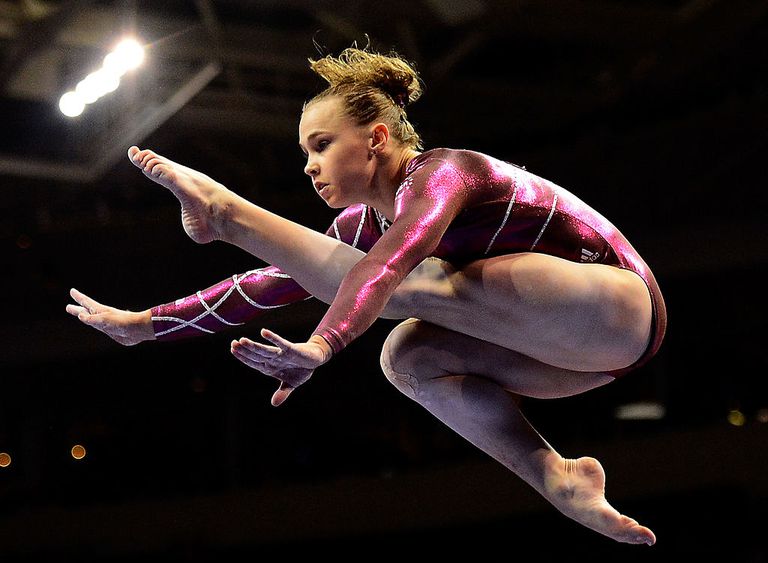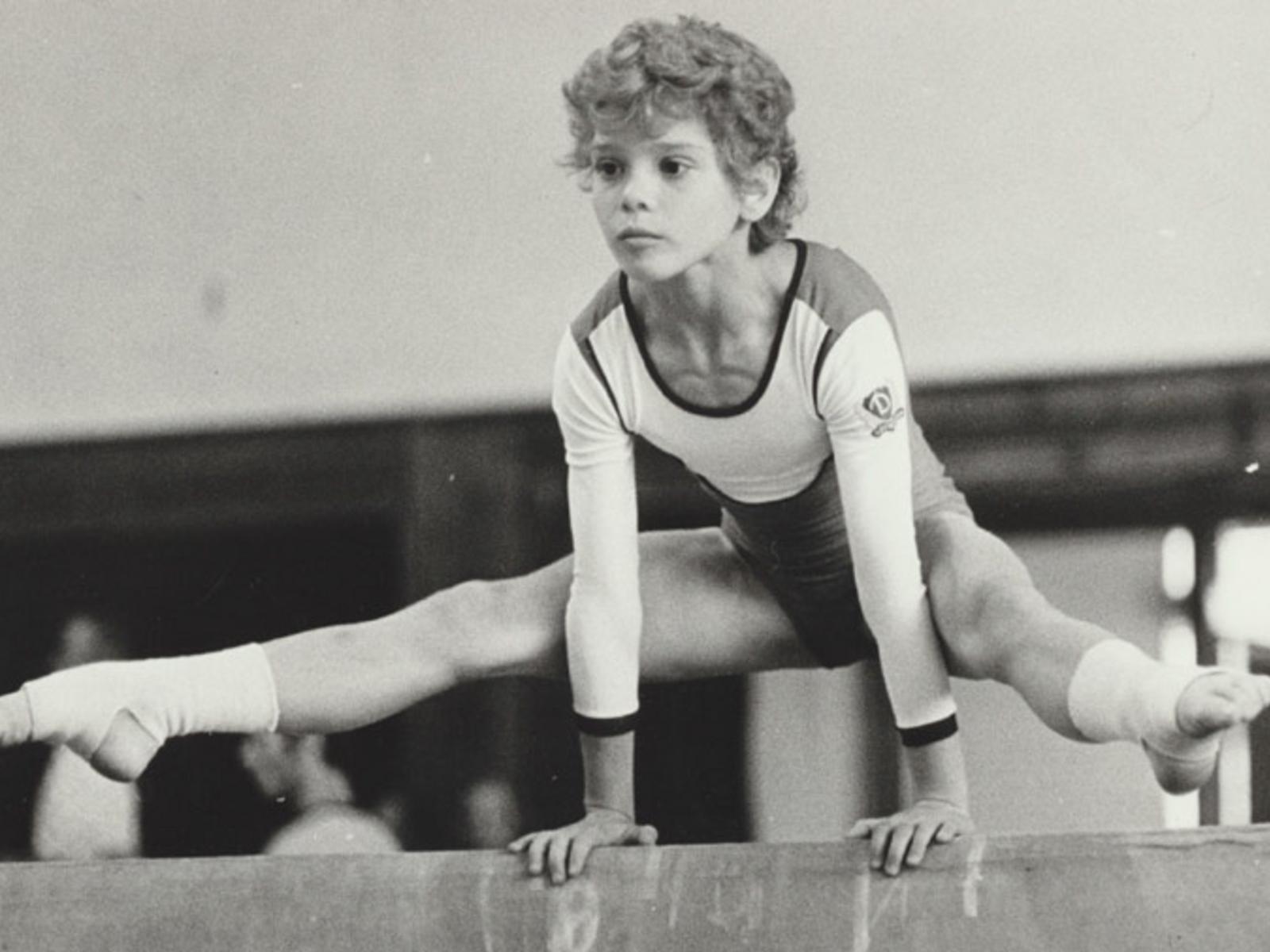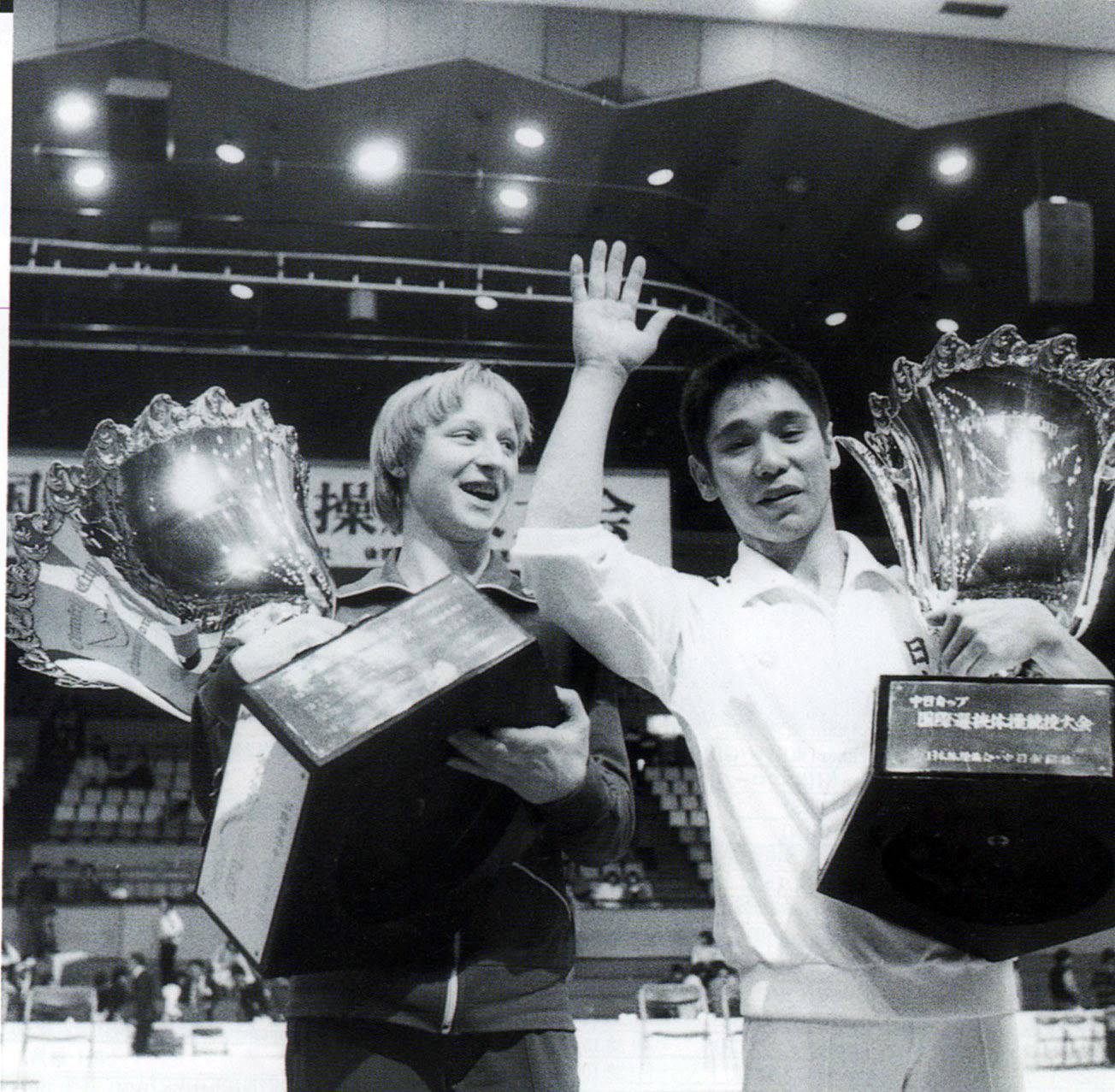In my points system used to rank gymnasts, there are 103 gymnasts who have recorded five or more points. It is a very difficult threshold to hit and just about every gymnast who has done it has won a gold medal while doing it.
-93 of 103 gymnasts won a gold medal in an individual event (90%).
-99 of 103 gymnasts won a gold medal in an individual and/or team event (96%).
That leaves just four gymnasts who never won a gold medal in women’s artistic gymnastics (WAG). It is noteworthy that the number of gymnasts who have accomplished this feat is extraordinarily small. It takes significant talent to not win a gold medal and still manage to record 5-points. It requires at bare minimum, winning a medal in an individual event on three separate occasions.
But more surprisingly, these gymnasts didn’t just barely make the minimum cutoff, they exceeded it. Three of them have 6-points while the last recorded 7-points. So who are these gymnasts?

Rebecca Bross
Rececca is the only member of the quartet who recorded 7-points and as a result, she is the highest ranking gymnast in all of WAG history who doesn’t have a gold medal. Fans typically remember Bross as a gymnast who never reached her full potential. But what is often overlooked is that Bross racked up a significant medal streak just in the short time she was around. Among her accomplishments was winning back-to-back All-Around (AA) medals at the World Championships. In 2010 she won four medals in a single World Championships.
But a longstanding history of injuries cut her career shot and her attempt at a comeback ended with a heartbreaking performance at the 2012 U.S. Olympic trails. Of the four gymnasts on this list, Rebecca is the only one who never appeared in an Olympics. Each of the three remaining gymnasts have an Olympic medal.
Rebecca Bross only appeared in two major competitions throughout her career. She is an example of someone whose time was short, but in that short time period she was a very effective gymnast. Bross had the unfortunate luck of not making an American lineup that won a gold medal in the team competition. In 2010 Team USA was unexpectedly upset by a juggernaut Russian program led by Aliya Mustafina. Bross was injured in 2011 while in 2009 she appeared in a World Championships where no team event was contested. It is that streak of ill-timing that is the single biggest culprit as to why Rebecca Bross doesn’t have a gold medal.

Dagmar Kersten
The similarities between Dagmar Kersten and Rebecca Bross are staggering. Both gymnast won a pair of medals on the uneven bars. Like Rebecca Bross, Dagmar also has an AA medal. She finished 3rd behind Oksana Omelianchik and Elena Shushunova at the 1985 World Championships. Both gymnasts experienced far more than their fair share of injuries over the course of their careers and competed in only two major competitions.
And just like Bross, Dagmar Kersten was brilliant and equally effective in those two competitions. She won six medals over the course of her career. In an era dominated by Romania and the Soviet Union, winning a gold medal in the team competition was out of the question. High ranking East German gymnasts like Dagmar typically won at least one gold medal over the course of their career, so why didn’t it happen with Kersten?
It probably has to do with Dagmar’s status as an East German gymnast who competed in the late 1980s. East Germany went from an unstoppable WAG program to a non-power seemingly overnight. Its declining results comparable to what WAG fans have seen with Romanian gymnastics in the last decade. East German gymnasts hadn’t become less talented, but the across the board decline was indicative of its gymnasts struggling to cope with the economic and political upheaval that was overtaking the nation. The country itself would disappear just two years later.

Of all the gymnasts in this quartet, Dagmar Kersten is probably the one who deserves the most respect. Dagmar had to overcome significant adversity over the course of her career. Kersten was subjected to training methods that are infuriating to read about. The finer details are something I’m not going to get into because it requires a separate article to approach this topic with the respect it deserves.
There was also an atrocious injury history. By the time she was 15 years old Dagmar had to be sidelined by back problems. In a two year stretch from 1986 to 1987 Dagmar appeared in just two competitions. For context, your typical gymnast from that era would have appeared in 15-25 competitions over the course of two years. That left the 1985 World Championships and the 1988 Olympics as the only major competitions of Dagmar’s career.
To add context: Dagmar Kersten has a longstanding history of “breaking the silence” by openly talking about the abusive training methods that existed inside the East German gymnastics program. Some of her 1988 Olympic teammates have voiced similar statements of their own on this matter.
Two weeks ago German gymnasts Pauline Schafer and Helene Schafer came forward under #GymnastAlliance to describe the abusive coaching conditions they have experienced. Dagmar Kersten broke five months of inactivity on Facebook to publish the story to her timeline. She then added a comment about people dismissing #GymnastAlliance as something that makes her want to puke. It is unmistakable as to where Dagmar stands on the topic of gymnastics needing to eradicate its abusive coaching culture.

Larisa Iordache
One of the themes in this article is every member of the quartet having similarities with another member. Its simply too much of a fluke occurrence to hit the 5-point threshold without a gold medal. So when it happens it usually involves gymnasts who competed under similar circumstances. In the case of Larisa Iordache, her circumstances were quite similar to that of Dagmar. Both gymnasts witnessed the complete collapse of their national programs from a heavy favorite for at least a bronze medal in the team competition, to a program that would struggle to qualify for the Olympics in just a few years time.
Larisa hasn’t been dealt the best hand when it comes to dealing with injury, but her longevity has proven to be significantly better than that of Kersten and Bross. Larisa Iordache is the only gymnast on this list who is still actively competing. Her comeback is extraordinary given her age, previous injury history, and being two years removed from any sort of high level competition.
Last year fans would have questioned the possibility of Iordache staging a successful comeback. And perhaps this article will give an insight as to why Larisa has defied the skepticism. Larisa is one of the most successful gymnasts to have never won a gold medal. With that detal in mind, her motivation is probably above and beyond most of the gymnasts she is competing against.

Steffi Kraker
Steffi Kraker won ten medals over the course of her career at the Olympics and World Championships, nine of them were bronze. Whereas most of the gymnasts on this list were cases of WAGs who had very short runs of success only to be sidelined by injury, Kraker doesn’t fit that profile. She is the only gymnast who appeared to win medals time and time again, and always had to watch as someone else stood above her during the medal ceremony.
Steffi Kraker competed in more competitions than anyone else on this list, but she is the only member of the quartet who never won an AA medal. For comparison, Larisa, Bross, and Dagmar have five AA medals combined. This isn’t to say Steffi wasn’t an accomplished gymnast. If anything, she’s probably the most accomplished member of the quartet.
Steffi Kraker won four medals at the Olympics and has a career total of 21 medals in the four major competitions of the Cold War era. To put that in perspective, her career medal count is closer to that of Nadia Comaneci than gymnasts such as Oksana Omelianchik, Olga Mostepanova, Aurelia Dobre, and Natalia Yurchenko. As a result, Steffi Kraker is the only member of this quartet who was inducted into the Hall of Fame.
Where Steffi compares to the other gymnasts on this list, being an East German gymnast like Dagmar Kersten and stuck in the “3rd power” dilemma. Of the four gymnasts on this list, three of them won bronze medals, and only bronze medals in the team competition. The fourth was Rebecca Bross who has a silver medal in the team competition.
Conclusion
Not every gymnast builds a legacy for herself by winning medals. Some gymnasts do it in other ways. Some have revolutionized the vault (Yurchenko), dominated an Alternate Olympics (Mostepanova), and gone viral on the NCAA circuit (Katelyn Ohashi). Some have been so successful at winning medals that at a certain point it stops mattering whether those medals are gold, silver, or bronze.
Their body of work becomes so impressive that fans respect their talent and forget the finer details of their medal count. These four gymnasts have such powerful names that in some cases, readers may be surprised to learn they finished their career without a gold medal. Proving you don’t need a gold medal to be viewed as a legendary gymnast.


